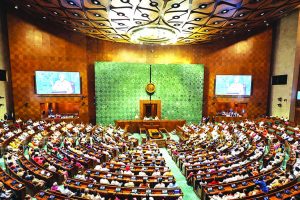One must tread extremely cautiously on sub judice matters, especially if they pertain to the ‘uniform’ as it must stand tall to defend the citizenry, at the borders or within, at all times. It is for good reason that the ‘Uniform’ is spared the societal morass, partisan passions, and unnecessary usurpations in the discourse, as it compromises on the healthy ‘distance’ from competitive politics. Sadly, even the ‘sword arm’ of the nation has seen many unwarranted taints of politicisation, bias, and partisan appropriations that dilute its apolitical perceptions.
The ‘Uniform’ has an indoctrinated culture of reserve on expressing any partisan/political reaction or preferences, whilst in service. Therefore, there is also a reciprocal duty on people in positions of power to act with deference and respect towards those on duty, to not be patronising or provocative towards them. After all, those in ‘Uniform’ are also humans with families in civilian environs facing societal challenges, while the soldiers continue operating in challenging conditions with surreal expectations to uphold their professionalism, irrespective of the work conditions or familial situations, back home.
Advertisement
Therefore, any incident of their purportedly falling short of their duties must be investigated with seriousness, sensitivity, and holistically to understand the circumstances and shortcomings in conduct, if any. Such instances do not need the protection of hyper-nationalists, or conversely, those who attribute a ‘agenda’, as the institution of the ‘Uniform’ (unlike in a country like Pakistan) does not have an independent agenda of its own, though, instances of individual culpability can never be ruled out. That said, within the landscape of various ‘Uniforms’ in the Indian context, the Policing services (State Police, Central Investigative Agencies, and the various Central Armed Police Forces) who work in close contact with politicians, have come under increasing questions of misuse, beholden conduct, and partisan alignments. Unfortunately, the politicians do not recognise the dangerous dilutions and provocations that their behaviour and opinions inflict on the policing services.
This is especially because the mandated ‘distance’ from politicians is knowingly compromised, unlike that for the Armed Forces. Sadly, they too are getting unhealthily invoked in the partisan fight for oneupmanship. For certain organisations like the Central Industrial Security Force (CISF), that challenge manifests daily with its task to enforce the various security procedures and protocols, yet maintaining a peoplefriendly approach. Their natural exposure and public interface can run into millions of interactions given the tasks at airports, railway stations, metros, industrial facilities, government buildings and other security duties, daily.
Given the inherent and regrettable sense of entitlement that consumes many Indians with its unique VIP (or even VVIP) culture, there is a shameful tendency to believe that such people are above the procedural laws. Handling such vain and boorish behaviour can result in difficult situations for the security personnel. Yet the onus on maintaining civility, professionalism, and politeness in the face of such odds, is warranted. While standing up to power is expected (in order to ensure the due diligence of procedures) ~ tact, restraint, and ignoring certain expected provocations is mandated. It must be always remembered that many amongst the Indian Armed Forces who guard the borders may not agree with many of the dispensations, policies, orders, or even utterances ~ however, that cannot be justification for lowering the guard or conducting themselves in a manner that does not behoove a soldier. Some may even feel strongly about the socio-political issues facing their families back home, however the same does not legitimise any expression of a reactionary nature, whilst in service.
Many pay the ‘ultimate price’ as part of their service conditions, even if they disagree with the dispensation of the day ~ after all, they are representing and defending the Constitution of India and its citizens (without fear, favour, or bias towards anybody), and not any political party or person. Sadly, while the same spirit is mandated in equal measure on the politicians, bureaucrats, and suchlike VIPs, they do not demonstrate reciprocal decency and dignity towards service personnel on duty. However, the culture, rules and traditions of the ‘Uniform’ affords no justification (however justifiable in any other realm) to react to any provocation, similarly. It is often an unfair and unequal expectation, but it is so. Therefore, unsurprisingly the ‘Indian Soldier’ always tops the public trust/confidence perceptions, whereas the politicians are always at the bottom of the heap. Societal views may differ but for the ‘Uniform’ nothing justifies dereliction of duty; therefore the Indian Army Officer who tied a civilian to his jeep (whatever be the circumstances) in Kashmir was duly ticked off for his unbecoming act.
The maxim that ‘two wrongs don’t make a right’ is useful as it was also true that the ground situation (and the accompanying operational reality) did put the errant officer and his troops to immense risk of life and limb, but that unfortunately (howsoever unfair it is) does not justify a reactionary wrong. That is the oft unseen nobility, professionalism, and personal sacrifice with which the soldier puts himself/herself to defend the country and its citizens (however oblivious and ungrateful, they be). The Sri Lankan soldier who attacked the then Indian Prime Minister, Rajiv Gandhi, as he was reviewing the formal Guard of Honour was subjected to a Court Martial and sentenced to prison. His plea that he was enraged by India’s ostensible interference in Sri Lanka’s domestic affairs with its purported support to the Liberation Tigers of Tamil Eelam (LTTE), was held as untenable. He did have many within the Sri Lankan polity sympathizing with his act, but the service rules brook no dereliction of duty, whatever be his personal opinions. The recent incident at Chandigarh airport is undergoing the due process of review and it would be improper to comment on the same without full knowledge of facts.
Everyone, especially the parties involved, must hold their horses (which they sadly didn’t by making the same old insinuations and aspersions that have polarised and inflamed the country). While the immediate action of arresting the errant service professional is done, it is important to spare a thought for service personnel, their service conditions, and the unseen amount of hurt that they have to endure as humans with families and emotions. While the ‘Uniform’ will always put discipline and professionalism over all circumstances and provocations (as they must) ~ it is sad that we don’t hold other institutions and VIPs (especially politicians) to similar standards of restraint in public domain.
(The writer is Lt Gen PVSM, AVSM (Retd), and former Lt Governor of Andaman & Nicobar Islands and Puducherry)











